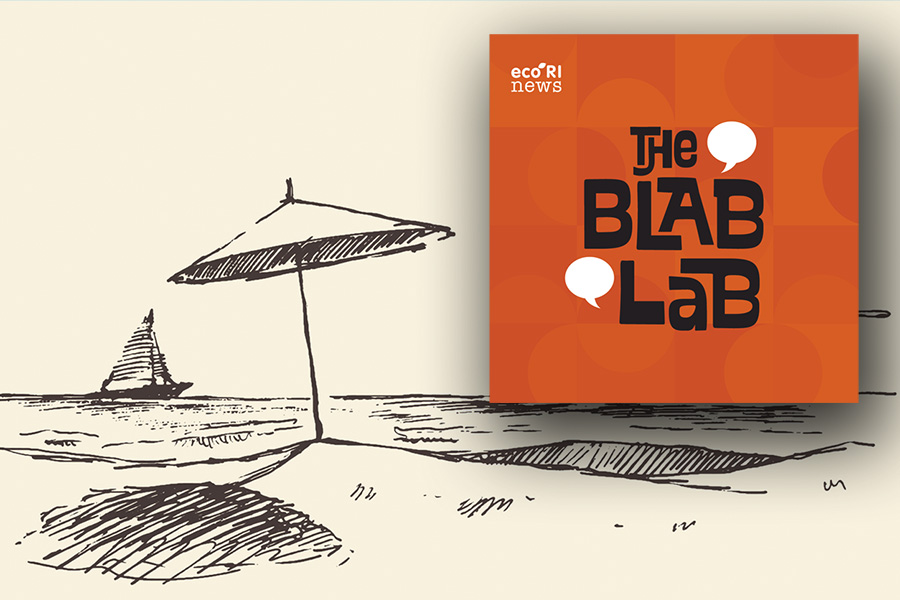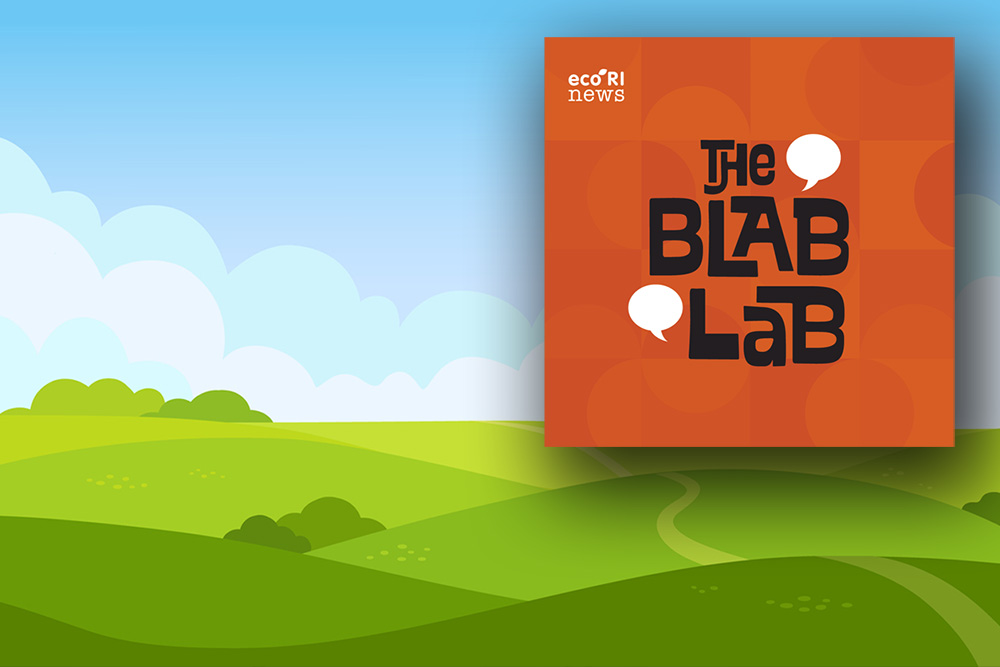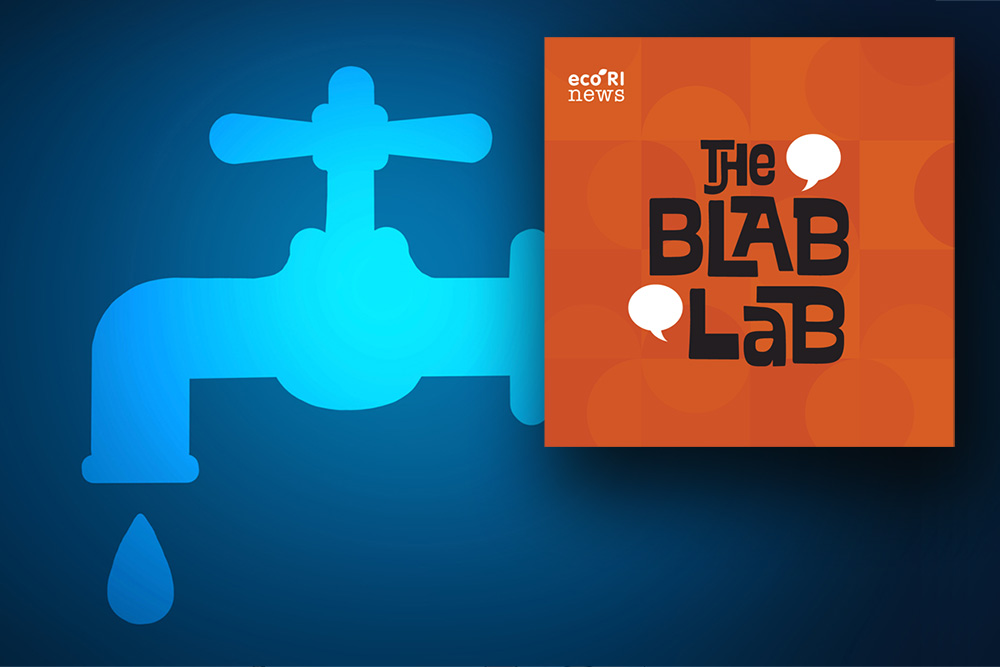Peachy and Not-So-Peachy Eco Beach Reads
July 27, 2023
Heat waves! Extreme weather! Wildfire smoke! Rising seas! It can all feel a bit overwhelming. ecoRI News reporters Rob Smith, Colleen Cronin, and Frank Carini share some of their picks for eco-related books that help them lean into (Frank) or escape (Rob and Colleen) the dire climate headlines.
Subscribe and listen on iTunes, Spotify, or wherever you get your podcast.
This transcript was edited for clarity and length.
Colleen Cronin
Welcome to The Blab Lab, a twice-monthly podcast from the reporters of ecoRI News, where we unpack the critical environmental issues facing southern New England. I’m reporter Colleen Cronin. And today we’re switching it up a little. Usually on show, I sit down with senior columnist Frank Carini or reporter Rob Smith. But today, both are on the show to recommend our favorite books, movies, and contributors to the environmental genre. So just to get started … Age before beauty …
Frank Carini
So, I’m going last?
Colleen Cronin
Frank, how are you?
Frank Carini
Good. How are you?
Colleen Cronin
I’m good. I’m good. And Rob, how are you doing? I’m happy to have you guys on the show. Today, we’re talking about beach reads, but not even really beach reads, because some of these topics are not so light and fluffy. But just before we get started, how often are you guys consuming things that are about the environment outside of work, because I think for a lot of people, they feel a little overwhelmed with how much negative climate news they’re getting. So how much are you guys spending your own time to dive into this topic that you constantly write about for work?
Rob Smith
Not really that often. I read climate news, but for like books and other pieces of media outside the environment, not that much.
Frank Carini
I basically spend my reading time reading books about climate, the environment, social injustice, climate injustice. That’s what I mostly read. And occasionally I’ll switch off and read, you know, science fiction, like Justin Cronin’s trilogy, The Passage, but most of the time, I’m reading nonfiction about, like I said, the environment, social justice, climate justice.
Colleen Cronin
I mean, I did just read The Overstory. But I think I also am like Rob, I’m trying to read fun things.
Rob Smith
I do my best to unplug.
Colleen Cronin
I think that’s smart.
Frank Carini
So, you’re calling me dumb?
Rob Smith
No, I mean, if that works for you, Frank, go ahead.
Colleen Cronin
So, I asked Frank and Rob ahead of time for some of their not-so-peachy beach environmental reads, and the way that Frank titled his list was, “Four books that scared, inspired, and educated me.” Frank, what are those books that scared inspired and educated you?
Frank Carini
One is What We Leave Behind, by Derrick Jensen and Aric McBay. It’s a basically a book about all the damage we’re doing to the natural world. Awesome book. It’s awesome in terms of the depth behind it, and all the work the authors did to produce it.
The Big Thirst, by Charles Fishman, is about how we’re using and abusing our water resources. Another excellent book with some positive news about what’s being done.
Speaking of water, Song for the Blue Ocean, by Carl Safina. It’s about — not water as a drinking resource — but water as marine resource.
And the last one, The World According to Monsanto, by Marie-Monique Robin, and it’s basically how Monsanto took over food production and seeds — and all the harmful and horrible poisons that we spray around now.
Colleen Cronin
Rob, what are the books that you have?
Rob Smith
Mine aren’t so doom and gloom. Well, one is doom and gloom. One of the things that bugs me about a lot of the climate-change books is they sometimes don’t hammer home the point enough about why we should save the environment or why the environment is good.
So, my first recommendation is The High Sierra: A Love Story, by science fiction author Kim Stanley Robinson. And it’s a hybrid memoir/nonfiction book about the Sierra mountains in California. And half of it is his memory of his life with his friends and his relationship to the mountains and how he would go hiking a couple times a year throughout his life, and the other half is interesting environmental Information about the Sierras. It’s a fun book.
My next book is not as fun, but it is along the same lines. It’s called Desert Notebooks, by Ben Ehrenreich. It’s a little more negative. But like the previous one, it’s a hybrid memoir, but it’s about the desert. And it’s about the history of the Indigenous populations in Joshua Tree National Park and the Mojave. And there’s a lot about the end of civilization and the end of the world — how climate changes could bring an end to our civilization, but also how the Indigenous populations conceptualize the end of the world. It’s a lot of different things. And it is kind of a downer read, but it’s interesting.
Colleen Cronin
The two books that I wanted to recommend are Cod: A Biography of the Fish That Changed the World. This is a great beach read. So, cod, and fish in general … their populations are declining because of overfishing. And now we’re seeing how the impact of climate change and warming waters is impacting fishing.
But I grew up on Cape Cod with a lot of fishermen. And there’s just a lot of things that are changing about our waters. And I think that “Cod” is an interesting book because it gets at the history of this fish that has just been omnipresent in so many different cultures and been the foundation, the author would argue, of migration of Europeans to North America.
It also is delicious. And there are recipes in the book. And there’s some sad parts and some gloom about the fishing communities, specifically in Canada, that are really suffering because this industry is dying. But there’s also a lot of interesting facts and history. And I think that if you’re on Cape Cod this summer, if you’re by the beach, and you’re getting fish and chips, it’s a book worth reading.
My second pick is Why Fish Don’t Exist, which I read last year. It’s a combination memoir and a history of the person who identified a lot of fish. But then it also talks about sort of the problematic nature of that from both the scientific perspective and a social perspective, and I’m not going to spoil and tell you why fish don’t exist, but you should read it.
Frank Carini
Where does the title come from?
Colleen Cronin
We can’t say. I don’t want to be a spoiler.
Rob Smith
I don’t think it’s a spoiler; it’s out there.
Colleen Cronin
OK, so fish don’t exist because we didn’t have a good understanding of DNA back then. And we just kind of grouped things that looked similar together. But then it turns out that a lot of the things he catalogued as fish aren’t really fish. They’re mammals.
Rob Smith
Like how the Bible calls whales fish.
Colleen Cronin
So that’s … that’s the spoiler.
Rob Smith
I don’t think it’s a spoiler.
Colleen Cronin
So, those are my two books. They both have to do with fish. I’m from Cape Cod. We’re in Rhode Island. So that sounds appropriate. For those of us who maybe again don’t want to spend the whole summer on the beach reading about this stuff and you’d rather watch a movie instead.
Frank Carini
I never read on the beach.
Colleen Cronin
You never read on the beach. What do you do on the beach?
Rob Smith
Do you go to the beach?
Frank Carini
I go to the beach. But only when it’s overcast, drizzly, or winter. I do not go in the summer when the sun is out.
Colleen Cronin
So, movies … I’m gonna recommend Dark Waters. It’s a great environmental movie. It’s like an Erin Brockovich type movie, where there is a person discovering that there are toxic chemicals in every facet of life. I’m also going to recommend the movie because Mark Ruffalo’s in it, and I love Mark Ruffalo. But it’s a good movie. I think it’s interesting. I think it’s very relevant because it’s about forever chemicals (PFAS) and about Teflon. And the discovery that your carpet, your pans, your sofa — everything could have forever chemicals in it. It’s terrifying. But it’s only terrifying for 90 minutes. And so instead of taking days to read a terrifying book, you could just get a little bit scared in movie form.
For our last category, do you guys have websites that you’re looking to? Obviously, you should read ecoRI News, if you want to get the latest climate news in Rhode Island. But are there other websites or journalists you guys enjoy reading, who maybe take an interesting look at climate?
Rob Smith
I enjoy Heatmap; it’s a climate-change newsletter. That’s good. I also like the Washington Post climate section, but that’s different. They don’t put stuff out all the time. It’s only when they have stories. But Heatmap comes out with a newsletter every day. But you do have to pay to subscribe.
Frank Carini
I get The Narwhal newsletter. It’s based in Canada. I do read The Guardian, I think they do a good job with their environment, climate crisis coverage, I do read a lot of their stories.
Colleen Cronin
One thing that I was going to recommend — The Ezra Klein Show podcast. I have really enjoyed his episodes about climate change, but he’s mostly covering it from a policy perspective. It’s a very interesting way to look at it. He talks a lot about how things are going to be able to be implemented. I think from a very pragmatic standpoint that maybe people who don’t yet feel like climate change is influencing their everyday lives may have an interest in the podcast.
Thanks, Frank. Thanks, Rob.
And thank you to our listeners for following along.
We want to thank Vanessa Carlton for letting us use her song “Willow” for our theme song, which you hear at the beginning and end of every episode. We also want to thank Roger Williams University and professor Bernardo Motta for letting us use their recording studio. If you have any questions, tips, or podcast ideas, email me at [email protected].
Categories
Join the Discussion
View CommentsYour support keeps our reporters on the environmental beat.
Reader support is at the core of our nonprofit news model. Together, we can keep the environment in the headlines.
We use cookies to improve your experience and deliver personalized content. View Cookie Settings



